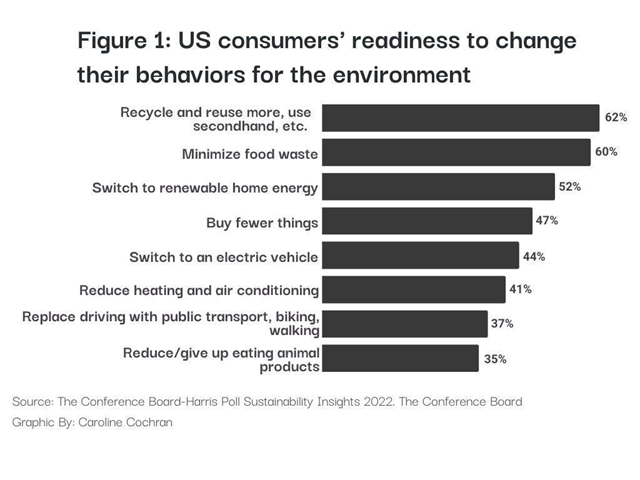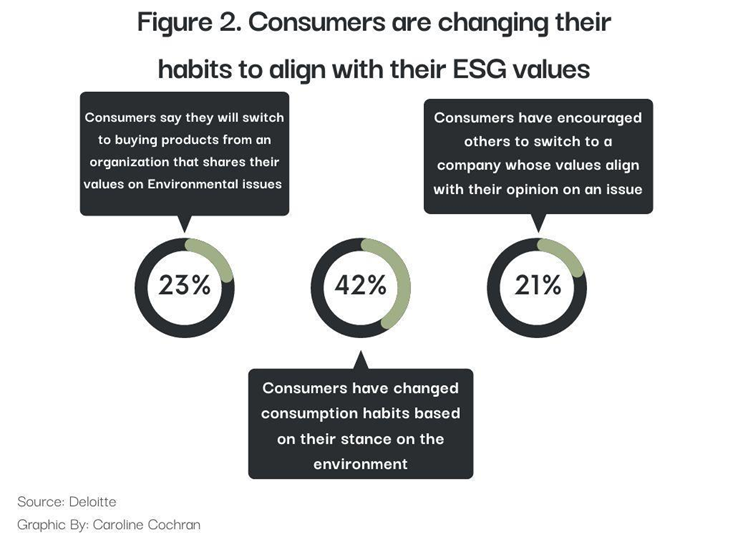Why ESG-Reporting is Becoming Increasingly Important for Businesses
Discover the growing importance of ESG reporting for businesses. Learn how companies are responding to consumer and investor expectations, and the potential impact on their reputation and bottom line. Find out why ESG disclosures are crucial for shaping stakeholders' perceptions and staying relevant in today's economy.

Introduction
Sorting trash, reusing grocery bags, investing in expensive solar panels, choosing paper straws, protesting discrimination, championing equality, increasing diversity; what do these actions have in common? They are driven by care. People engage in these behaviors because they care about making a positive impact on the world and are concerned with environmental, social, and corporate governance (ESG) issues. Across the globe, individuals are consciously altering their lifestyles to mitigate environmental impacts and promote social improvements. According to the Conference Board, a global research nonprofit organization, “More than two-thirds of Americans say they are now concerned about climate change, and a majority expect fellow Americans to be willing to change their consumption habits as a result ”.
While individual efforts may seem of little significance, large corporations can wield significant influence in matters of environmental and social issues. These issues have become increasingly important to investors and consumers who are putting pressure on corporations to take ESG matters seriously and make them a priority. Corporations communicate their commitment to ESG matters through corporate disclosures. Accurate and transparent disclosures can be vital to stakeholders’ perceptions of a company’s commitment to ESG-related issues. The Securities and Exchange Commission (SEC), charged with investor protection in the United States, recently proposed to enhance and standardize companies’ climate-related disclosures for investors and enhanced disclosures by certain investment advisors and investment companies on ESG investment strategies and practices.
This article begins with a discussion of the SEC proposals, followed by a discussion of consumer and employee expectations in relation to ESG issues, and how consumer behavior is evolving to support or penalize businesses based on their ESG progress. The article will conclude with a discussion of the impact of ESG on investment strategies.
The Significance of the SEC Proposals
Recently, the SEC proposed a rule that would require public companies to disclose specific climate-related information. These disclosures include carbon emissions produced by the company (or value chain) and mitigating the company’s carbon footprint. While many large, public companies are already producing ESG reports with similar disclosure, the proposed regulation would require standardized disclosures to enhance the consistency and comparability of the information for investors. This should improve the decision-usefulness of information for investors, creditors, and other stakeholders who increasingly exhibit greater interest in ESG-related matters.
Additionally, the SEC proposed to enhance disclosures by certain investment advisors and investment companies about ESG investment practices. This would require firms to disclose more specific information based on the ESG strategies they pursue. Additionally, it would require that funds claiming to have an ESG impact disclose what specific impacts they seek and what progress they have seen. This proposal aims to further comparability and constancy of information provided to investors whom these funds affect and those who are interested in ESG- investment practices.
What do Consumers Think?
An article published by McKinsey and Company in 2023 states that “total US consumer spending accounts for over $14 trillion annually and two-thirds of the US GDP.” Consumption is a critical component of the health of businesses and the overall economy. Given the significant role consumers play in supporting businesses, it is imperative for companies to acknowledge and address consumer expectations regarding ESG issues. Companies may need to consider adjustments to strategies and operations to meet consumers’ evolving expectations on these issues.
Consumers and employees want to support companies that care about the same issues they do. They have heightened expectations for “businesses to proactively shape ESG best practices, not just react and adjust.” According to a study done by Deloitte, “a majority (65%) of respondents expect CEO’s to do more to make progress on societal issues”. Additionally, a study done by PWC highlights how consumers, employees, and business leaders all believe that businesses should be shaping ESG practices.
83% of consumers think companies should be actively shaping ESG best practices. 91% of business leaders believe their company has a responsibility to act on ESG issues, and 86% of employees prefer to support or work for companies that care about the same issues they do.
Across the board, individuals are expecting businesses to take responsibility for creating and adhering to ESG best practices. To survive and thrive, companies not only need to actively work towards promoting ESG issues, but also to effectively communicate to stakeholders specific ESG-related goals, plans, and steps taken or measurable progress towards achieving those goals.
Consumers are Changing
Studies show that consumers are willing to change their habits based on businesses’ ESG efforts. Consumers and employees are concerned not only about the environment but also societal issues. Brand loyalty is often demonstrated towards companies that demonstrate robust ESG practices. Companies perceived to be lacking in this area may lose customers and market share. A study by Deloitte highlights that “consumers between 18 to 24 years of age are three times more likely to switch brands based on their personal values than those 65 years old and above.” Companies that want to be seen in a good light in the eyes of younger consumers need to be willing to align with the values that are important to them, which may necessitate changes in their business practices. According to PWC, “Seventy-six percent of consumers (said), they will discontinue relations with companies that treat employees, communities, and the environment poorly.” This reveals that not only do consumers care deeply about ESG issues but are also willing to change their behaviors based on their values. It begs the question: In what specific areas are consumers most willing to make such changes?
Figure 1 shows the results of a survey by the Conference Board. The survey highlights behaviors consumers are willing to change to benefit the environment.

In addition to consumers changing personal behavior to combat climate change, consumers are shifting their spending habits to favor companies that share their same values, particularly values relating to environmental and social issues. A study by Deloitte reveals that consumers are becoming more passionate about environmental issues. The study, published in the Wall Street Journal, shows that as individuals become more passionate about the environment, this activism correlates with brand loyalty.

Figure 2 shows the extent to which individuals' environmental and social values are changing their relationships with businesses. As consumers begin to change their preferences, it becomes increasingly important for businesses to align their practices with consumers' environmental and social values.
In what specific areas do consumers and employees expect businesses to change?

Figure 3 illustrates the percentage of people who are more likely to buy from companies that stand up for ESG-related issues. Additionally, it highlights that employees are more likely to choose to work for companies that prioritize ESG matters. Businesses should take into consideration consumer and employee preferences when determining their approach to addressing ESG-related issues.
Investment Strategies include ESG Integration
In addition to consumers changing their habits, investors are also altering their behavior based on companies’ ESG efforts. Investment advisors and investment companies are now integrating ESG disclosures into their investment strategies as highlighted in a study conducted by PWC, which states that “Investors poured $51 billion dollars into ESG-impact funds in 2020, more than doubling such investments within a year.” A current SEC proposal would mandate and further enhance these disclosures. Another study done by Capital Group, published by Harvard Law, reveals that “ESG integration, cited by almost six in 10 (59%) global investors, remains the most used implementation strategy.”
ESG is gaining increasing significance among investors because they increasingly “recognize that companies with good sustainable credentials are more likely to outperform. Furthermore, investors largely agree that investment returns and sustainable impact go hand in hand.” As ESG issues gain greater importance among the general population, investors expect companies to adapt in order to sustain growth in the future. Investors view companies’ proactive efforts to get ahead of the hurdle on ESG issues as an indicator of their ability to thrive amid evolving demands of the population.
Conclusion
Individuals are changing their habits to support a more sustainable lifestyle. As individuals make sacrifices to change their lifestyles, they expect companies to do the same. Companies are being rewarded or punished by consumers, employees, and investors based on their sustainability efforts and credentials. ESG disclosures, which may be required in the near future, are not just a matter of compliance. They are vital to shaping stakeholders’ perceptions and establishing reputation. ESG disclosures are vital to make the population aware of their company’s ESG initiatives. To survive and thrive in the current economy, there is a growing imperative for companies to promote, and communicate to stakeholders, efforts focused on ESG matters.
https://deloitte.wsj.com/articles/consumers-expect-brands-to-address-climate-change-01618945334


